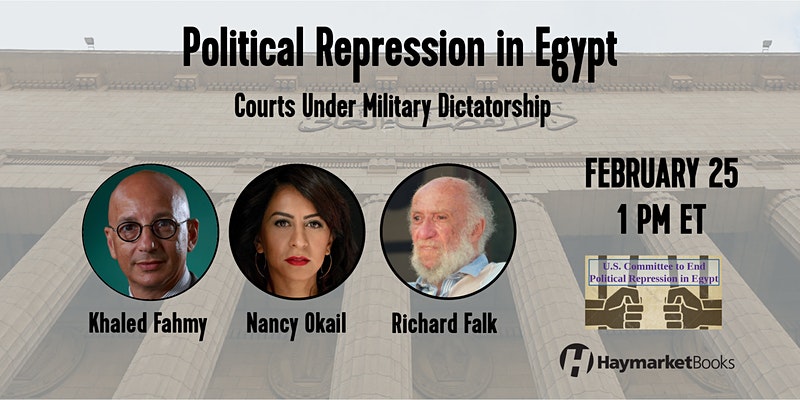Streamed live on Feb 25, 2022
This event is sponsored by the US Committee to End Political Repression in Egypt and Haymarket Books, the Committee for Justice, Democracy for the Arab World Now (DAWN), the Freedom Initiative, Internationalism from Below, Middle East Research and Information Project (MERIP), and St. John’s Center for International and Comparative Law
*** Arabic interpretation of this event can be accessed here: https://drive.google.com/file/d/1En5C…
The modern Egyptian judiciary was established in the middle of the 19th century and is one of the oldest in the Middle East. Throughout the 20th century and the first decade of this century, it enjoyed a large degree of independence from the executive branch of government. Since the coup of July 2013, led by then-head of the armed forces and current President Abdel Fattah Al-Sisi, the Egyptian state has gradually turned the judiciary into a subservient extension of presidential power to eradicate all opposition and critical voices from the public sphere.
Egypt’s parliament has been turned into a rubber-stamp institution which, in April 2019, approved amendments granting Sisi the “authority to appoint all chief justices of Egyptian judicial bodies and the public prosecutor.” The right to a fair trial in political cases has been effectively eliminated. The courts have been packed with Sisi sycophants. Intimidation and detention on trumped-up charges have become the norm for political opponents as well as for their lawyers, who are routinely brought into police headquarters for court hearings.
In this forum, experts on Egyptian legal history, human rights, and international law will discuss these attacks on the judiciary in Egypt. They will situate the discussion in a historical context and address changes in judicial structure and violations of the rule of law. They will link the muzzling of the Egyptian judiciary to the complicity of the U.S. and other Western governments in sustaining the Sisi regime through continuing military and financial aid. They will highlight the role of global solidarity in reclaiming the rule of law, stopping attacks on the independence of the judiciary, and supporting victims of the military dictatorship in Egypt.
Speakers:
Khaled Fahmy is Sultan Qaboos Professor of Modern Arabic Studies in the Faculty of Asian and Middle Eastern Studies at the University of Cambridge. His research interests lie in the social and cultural history of nineteenth-century Egypt, with special emphasis on the social history of the army, medicine and the law. His most recent book, In Quest of Justice: Islamic Law and Forensic Medicine in Modern Egypt, won the Peter Gonville Stein Book Award from the American Society for Legal History in 2019. He writes a blog about Egypt, the Middle East, and history.
Nancy Okail is President and CEO of the Center for International Policy in Washington, DC. She is a leading scholar, policy analyst, and advocate with more than 20 years of experience working on issues of human rights, democracy, and security in the Middle East and North Africa. In her subsequent role as Director of Freedom House’s Egypt program, Okail was one of the 43 nongovernmental organization workers convicted and sentenced to prison in a widely publicized 2012 case for allegedly using foreign funds to foment unrest in Egypt. She was then exonerated by court ruling in December of 2018.
Richard A. Falk is Albert G. Milbank Professor of International Law and Practice, Emeritus at Princeton University and Distinguished Visiting Professor in Global & International Studies at the University of California, Santa Barbara. He is a member of the Editorial Boards of The Nation and The Progressive, and Chair of the Board of the Nuclear Age Peace Foundation. During 1999–2000, Falk worked on the Independent International Commission on Kosovo. In 2008, Professor Falk was appointed for a six-year term as United Nations Special Rapporteur on Palestinian human rights. He blogs at Global Justice in the 21st Century.
Yasmin Omar (moderator) is a human rights lawyer. She specializes in international law, UN mechanisms, and global sanctions. She practiced law in Egypt for ten years, defending victims of human rights violations, before moving to the United States after being targeted for her work. Formerly Egypt legal associate at the Tahrir Institute for Middle East Policy, Omar is a member of the Steering Committee of the US Committee to End Political Repression in Egypt and the UN and regional mechanism officer at the Committee for Justice.
